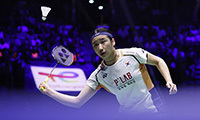Staff Reporter
Kim Ung-shik, a 31-year-old marketing manager at a major Korean conglomerate, heads to a fitness center near his office in Myongdong, central Seoul, almost everyday after work.
After sweating it out for an hour of exercise he doesn’t go directly. Rather, he speaks ``Ni Hao, ma?’’ meaning ``how are you’’ in Chinese, during an evening Chinese class at a private institution.
``The concept of `life-long working places’ has been an old joke among my generation. Organizations don’t and cannot guarantee an individuals’ future any more,’’ Kim told The Korea Times.
``Improving your competitiveness such as speaking many foreign languages is the only way to survive in a competition-fierce society,’’ he said.
``My other seniors at the company seem to be comfortable sitting late hours in the office even though there is no urgent task. But, I think it is much better to work out at a fitness center or learn Chinese,’’ Kim added.
Experts define people like Kim whose ages range between 26 and 35 as the ``5 Is’’ generation because their characteristics can be summarized at five key concepts _ individualized, innovative, inclined to fashion, into reality and intercultural.
``The 5 Is generation has experienced ``survival of the fittest’’ when the financial crisis hit many Asian nations including South Korea in 1997. They have witnessed their fathers, who once believed in the life-time job concept, getting laid off by financially-troubled companies during the period,’’ said Professor Kwon Up, from Keimyung University in North Kyongsang Province.
``Having seen the trend, the 5 Is generation learned a painful lesson that nobody, companies or big organizations, can guarantee their future. Thus, they trust only themselves rather than being royal to those organizations,’’ the professor said.
Confronted with the reality, most of 5 Is generation become so-called ``saladents,’’ derived by combining the terms; salaried man and student.
Lee Kwang-su is a saladent; working by day and studying at night after work to enhance his future.
Lee, a 30-year-old certified public accountant, has been sitting on a chair at a library during weekends to prepare for a Chartered Financial Analyst (CFA) test.
Although he passed this accountancy test three years ago, Lee isn’t satisfied.
Thanks to his extra efforts, he made it to the second phase of the CFA test last June and is now preparing for the last screening phase.
``Even in the case of some crisis moments, if you have competitiveness, you can survive. You have to upgrade your ability continuously,’’ Lee said.
Another characteristic of the 5 Is generation is an inclination toward fashion. Indeed, their shopping carts don’t roll only in Korea.
``I took a week vacation during the Christmas season to go on a `shopping tour’ of Hong Kong. As domestic importers have limited shopping lists and it is difficult to find something which fits my own taste, I go abroad to shop twice per year,’’ said a 32-year-old office worker in Seoul.
``Usually, many big-brand shops offer special Christmas prices which are sometimes at half price in Korea. So, it is even cheaper to buy goods abroad when you take every cost into consideration,’’ said the worker, who wants to be only identified by her family name, Hwang.
It is said the 5 Is generation’s fearlessness in going abroad is possible because many have experienced numerous cultures through so-called backpacking tours which have been popular among Koreans since the 1990s.
According to a recent survey by Cheil Communications, almost 47 percent of the 5 Is generation have overseas experience such as backpacking or taking a language course in English-speaking countries.
Seoul University professor Lee Yun-sok said it is nonsense to expect the 5 Is generation to undertake the concept of life-long loyalty to a workplace when that generation is focused on individualism.
``Rather, society should expect other aspects from the generation,’’ Professor Lee said.
``I think that the generation will play a crucial role in changing society into a more horizontal one and become the main force of society,’’ Lee said.
kcw@koreatimes.co.kr
스마터리빙
more [ 건강]
[ 건강]이제 혈관 건강도 챙기자!
[현대해운]우리 눈에 보이지 않기 때문에 혈관 건강을 챙기는 것은 결코 쉽지 않은데요. 여러분은 혈관 건강을 유지하기 위해 어떤 노력을 하시나요?
 [ 건강]
[ 건강]내 몸이 건강해지는 과일궁합
 [ 라이프]
[ 라이프]벌레야 물럿거라! 천연 해충제 만들기
 [ 건강]
[ 건강]혈압 낮추는데 좋은 식품
[현대해운]혈관 건강은 주로 노화가 진행되면서 지켜야 할 문제라고 인식되어 왔습니다. 최근 생활 패턴과 식생활의 변화로 혈관의 노화 진행이 빨라지고
카테고리 최신기사
- 4기 폐암 치료
- 이강인 PSG 떠난다, 3년 만에 라리가 복귀 임박 “아틀레티코, 파리까지 찾아와 협상... 시메오네가 찍었다”
- 운명의 한일전, 韓 4강 진출 시 확정... ‘어떻게 이런 행운이’ 日 준결승 선착, 승부차기 끝에 요르단 격파
- 뜨거운 ‘韓日 동맹 라인’ 이토 AS→김민재 골 ‘열도 홀렸다’... 일본 “콤파니 황태자들, 완벽히 해냈다” 찬사
- 마인츠, 하이덴하임 2-1 꺾고 ‘꼴찌 탈출’
- ‘환상 1호골+최고 평점’ 김민재 특급 맹활약, 뮌헨에서 가장 빛났다... ‘17G 무패’ 압도적 우승 페이스
- 이재성이 마인츠 살렸다! 2경기 연속 ‘미친 택배’ 도움... 마인츠, 하이덴하임 잡고 드디어 ‘꼴찌 탈출’
사람·사람들
more
인터뷰-한국어진흥재단… “한국어 확대 체계적으로”
차세대 한국어 및 한국문화 교육을 목표로 활동해 온 한국어진흥재단이 2026년 제16기 이사회에서 유니스 이 이사를 신임 이사장으로 선출하며 …

캘리포니아 태권도협회 이취임식
캘리포니아 태권도협회(CTU) 신년회 및 회장 이·취임식 행사가 지난 10일 오렌지카운티 한인회관에서 열렸다. 이날 행사에서는 용호재 관장이 …
1945년 해방둥이 모임 신년모임
올해로 창립 11주년을 맞은 1945년생 해방둥이 모임(회장 최용자)은 지난 10일 해피 노래교실에서 신년모임을 열고 회원 간 친목을 다졌다.…
전남대 남가주 동문회 신년회
전남대 남가주 총동문회(회장 차흥주)는 지난 10일 아리수 식당에서 동문과 가족들이 참석한 가운데 2026년 신년회를 개최했다. 이날 참석자들…
도산사업회 신년하례식 26일 아로마센터 5층
미주 도산안창호기념사업회(회장 데이빗 곽)는 오는 26일(월) 오후 5시30분 LA 한인타운 아로마센터 5층 더원 뱅큇홀에서 ‘2026 신년하…
많이 본 기사
- 트럼프, ‘JP모건 CEO에 연준의장 제안’ WSJ보도에 “완전히 거짓”
- 이스라엘, 美 가자집행위 구성 반대… “우리 정책에 반해”
- 미국인 53% “트럼프, 경제 대신 … 1
- 아르헨 밀레이, 트럼프 주도 ‘평화위원회’ 창립멤버 참여키로
- 54년만에 달 가는 美로켓, 발사대로…우주비행사들 “준비됐다”
- “이란, 인터넷 영구차단 추진…인증된 소수에게만 허락”
- 트럼프, 그린란드 파병 8개국 “10% 관세”…유럽, 공동대응 채비
- 머스크, 오픈AI·MS 상대로 최대 1천340억달러 손해배상 요구
- 트럼프, SNS에 본인 사진 올리며 “관세 왕” “미스터 관세”
- 전 나토총장 “트럼프, 우크라 종전 안되니 그린란드 위협”
- “인천공항서 생돈 ‘50만원’ 날렸어요”…엉엉 운 외국인 관광객, 왜?
- 노벨상 메달 트럼프에 헌납한 마차도에… 1
- ‘권상우 ♥’ 손태영, 사랑받는 며느리였다..시母 “한국서 요리하지 마라” 애정 뿜뿜
- 이강인 PSG 떠난다, 3년 만에 라리가 복귀 임박 “아틀레티코, 파리까지 찾아와 협상... 시메오네가 찍었다”
- 필리핀 거대 쓰레기더미 붕괴 사망자 28명·실종자 8명
- ‘징역 5년’ 尹측 “사라진 법리·붕… 1
- 사유리, 젠 위한 아빠인가..기모노 … 1
- 보모와 불륜 북VA 남성, 완전범죄 노리고…
- 방탄소년단, 정규 5집 제목 ‘아리랑’에 외신도 집중 “사명의 연장선”
- “대기자 명단 신청 접수하세요”
- 러트닉 “美에 투자하지 않으면 반도체… 1
- “전세계 금수저들, 향후 10년간 4… 1
- 2026년 파월 vs 1948년 에클스… ‘연준 독립성’ 평행이론
- 가자 평화구상 2단계 속도…하마스 무장해제 최대 난관
- “모델 같은 얼굴, 재산 노렸나” 박나래 전 남친 사태..기안84 발언 ‘파묘’
- ‘32분이면 충분’ 안세영 결승행, 中은 또 좌절한다... ‘여제에 9연패’ 왕즈이가 결승 상대
- 트럼프, 1기 때 풀어준 사기꾼 또 사면…고액 후원자 가족도
- 엔비디아 H200 부품 공급업체, 中통관 규제 탓에 생산 중단
- 지상렬, ♥신보람과 열애 인정 후 첫… 1
- 트럼프 “그린란드 문제 협조 않는 나라에 관세 부과할 수도”
- 커쇼 은퇴 번복, WBC 전격 출전→… 1
- 자동차 재산세 폐지 법안 나올까 2
- 아유미, 갑작스러운 사업가 남편 차단 “그냥 쉬고 싶을 때”
- 아소 전 일본 총리 “북중러에 함께 대비를”
- “맛있는 음식 저렴하게 즐겨볼까”…레스토랑 위크 시작
- 내란·김건희·채해병 ‘2차 특검법’ 국회 통과
- 오픈AI, 미국서 챗GPT에 광고 도입…무료·저가요금제에 적용
- TSMC ‘미 생산 비례’ 관세 면제… 1
- 전자담배 폭발해 차까지 불타고 사용자 심한 화상…코트 주머니 속에서 갑자기 ‘펑’
- 운명의 한일전, 韓 4강 진출 시 확정... ‘어떻게 이런 행운이’ 日 준결승 선착, 승부차기 끝에 요르단 격파
- 장동혁, 국회서 ‘쌍특검 단식’ 사흘째… “아침에는 말도 잘 못해”
- 뉴욕증시, 고점 부담 속 잘 나가는 마이크론…하락 마감
- “박찬욱 ‘어쩔수가없다’, 미국서 韓영화 역대2위 흥행 예상”
- “17살 손자가 암이래요”…81세 백발 할머니가 게임 유튜버로 데뷔한 이유
- 연 5조 재정지원 당근… 광주전남 ‘환영’ 대전충남 ‘혹평’
- [인터뷰] 연세 글로벌 YG CEO “수준 높은 대면 강의… 강력한 네트웍”
- South Korea’s ‘Passport Power’ Remains in World’s Top Tier for 6th Straight Year
- 위대한 통일 비전이 위대한 나라를 탄생시킨다
- 경찰, ‘공천헌금’ 김경과 진술 엇갈린 강선우 前보좌관 재소환
- 굳은 표정의 윤석열
1/5지식톡

-
 한국 안경을 무료 배송으로 받아보실…
0
한국 안경을 무료 배송으로 받아보실…
0안녕하세요. 서울 안암동에 위치한 ‘보고싶다 안경원’입니다.저희는 다년간 한국 고객분들께 착용감 좋은 안경테와 한국안경브랜드,고압축 도수 렌즈를 합리적인 가격에 제공해온 안경 전문점입니다.이번에 해외 배송이 가능해…
-
 미 육군 사관학교 West Poin…
0
미 육군 사관학교 West Poin…
0https://youtu.be/SxD8cEhNV6Q연락처:wpkapca@gmail.comJohn Choi: 714-716-6414West Point 합격증을 받으셨나요?미 육군사관학교 West Point 학부모 모…
-
 ☝️해외에서도 가능한 한국어 선생님…
0
☝️해외에서도 가능한 한국어 선생님…
0이 영상 하나면 충분합니다!♥️상담신청문의♥️☝️ 문의 폭주로 '선착순 상담'만 진행합니다.☎️ : 02-6213-9094✨카카오톡ID : @GOODEDU77 (@골뱅이 꼭 붙여주셔야합니다…
-
 테슬라 자동차 시트커버 장착
0
테슬라 자동차 시트커버 장착
0테슬라 시트커버, 사놓고 아직 못 씌우셨죠?장착이 생각보다 쉽지 않습니다.20년 경력 전문가에게 맡기세요 — 깔끔하고 딱 맞게 장착해드립니다!장착비용:앞좌석: $40뒷좌석: $60앞·뒷좌석 …
-
 식당용 부탄가스
0
식당용 부탄가스
0식당용 부탄가스 홀세일 합니다 로스앤젤레스 다운타운 픽업 가능 안녕 하세요?강아지 & 고양이 모든 애완동물 / 반려동물 식품 & 모든 애완동물/반려동물 관련 제품들 전문적으로 홀세일/취급하는 회사 입니다 100% …
케이타운 1번가
오피니언

한인 2세들 ‘족쇄’ 국적법 신속 개정해야

노동법 준수로 공정의 새해 열자
 조지 F·윌 워싱턴포스트 칼럼니스트
조지 F·윌 워싱턴포스트 칼럼니스트 [조지 F. 윌 칼럼] 올 중간선거를 덜 불쾌하게 만드는 길
 최규성 삼성서울병원 이식외과 교수
최규성 삼성서울병원 이식외과 교수 [로터리] ‘토의 간’
 전병두 서북미수필가협회 회원
전병두 서북미수필가협회 회원 [금요단상] 꿀벌과의 인연
 심상용 / 서울대 미술관장
심상용 / 서울대 미술관장 [미술 다시보기] 모네와 연작의 경제학
 김정곤 / 서울경제 논설위원
김정곤 / 서울경제 논설위원 [만화경] 애플·구글 ‘적과의 동침’
 한 영 재미수필가협회 회장
한 영 재미수필가협회 회장 [한영의 독서칼럼] 햇살을 향해 헤엄치기
 이규민 한식진흥원 이사장
이규민 한식진흥원 이사장 [로터리] 시간을 담그는 문화, 한국의 장
1/3지사별 뉴스

뉴욕한인회‘제123주년 미주한인의 날’ 기념식 성황
뉴욕한인회(회장 이명석)가 13일 맨하탄 뉴욕한인회관에서 개최한‘제123주년 미주한인의 날’ 기념 행사가 각계에서 활동 중인 1.5세 및 2세…
국적이탈 수속에 2년이나 걸리다니⋯

연방의회서 “한인 위상·한미동맹 제고” 한목소리
한인 이민자들이 미국에 도착한 123주년을 기념하고 한인들의 미국 사회에의 기여를 알리는 ‘제 21회 미주 한인의 날’ 행사가 13일 연방의회…
보모와 불륜 북VA 남성, 완전범죄 노리고…

한미수교 100주년 기념 조형물 재설치 가능성 보인다
샌프란시스코 공원에 설치되어 있다 철거되어 창고에 보관중인 한미수교 100주년 기념 조형물이 다시 설치될 가능성이 열렸다.한국 국회 재정경제기…
재미한국학교협의회

오늘 하루 이 창 열지 않음 닫기 



















































.png)


댓글 안에 당신의 성숙함도 담아 주세요.
'오늘의 한마디'는 기사에 대하여 자신의 생각을 말하고 남의 생각을 들으며 서로 다양한 의견을 나누는 공간입니다. 그러나 간혹 불건전한 내용을 올리시는 분들이 계셔서 건전한 인터넷문화 정착을 위해 아래와 같은 운영원칙을 적용합니다.
자체 모니터링을 통해 아래에 해당하는 내용이 포함된 댓글이 발견되면 예고없이 삭제 조치를 하겠습니다.
불건전한 댓글을 올리거나, 이름에 비속어 및 상대방의 불쾌감을 주는 단어를 사용, 유명인 또는 특정 일반인을 사칭하는 경우 이용에 대한 차단 제재를 받을 수 있습니다. 차단될 경우, 일주일간 댓글을 달수 없게 됩니다.
명예훼손, 개인정보 유출, 욕설 등 법률에 위반되는 댓글은 관계 법령에 의거 민형사상 처벌을 받을 수 있으니 이용에 주의를 부탁드립니다.
Close
x